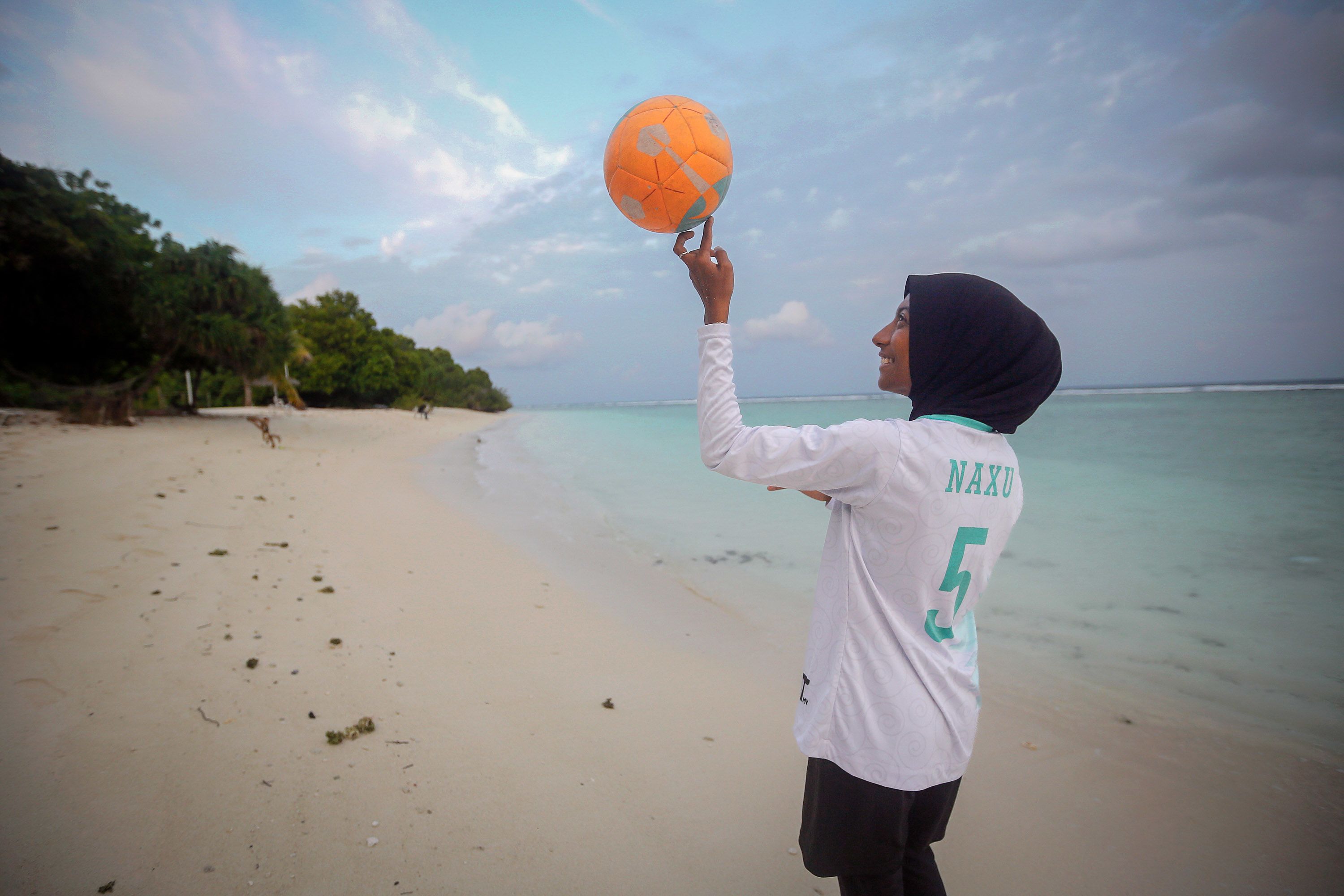UNDP and the EU have been working in Asia to address the social and cultural biases that limit girls' aspirations from a young age.
A place in all fields
September 21, 2022

Sat on green AstroTurf, a footballer in a number 5 shirt ties their shoelaces. It is a bright, hot Saturday morning. At the other end of the pitch, a small crowd has gathered to watch; small children’s fingertips grip the wire fence. The footballer gives them a small wave before adjusting her hijab.
Shaaiga is a professional player for the Maldivian National Women’s Football Team. As she runs to meet her coach Shiyana and fellow players, her heart is filled with joy. But getting to this point has not been easy.
Unlike many others on the team, Shaaiga grew up on the island of Manadhoo, 175 miles away from the country’s capital of Male’. In this remote community, there are limited economic or social opportunities outside of tourism or the fishing industry.
In the Maldives, the benefits of economic growth and gains from tourism or private industry doesn’t always reach everyone equally. The Covid-19 pandemic severely impacted the country's economic situation with the halting of international flights further reducing jobs and opportunities. At times of crisis, women and girls are particularly affected.
Despite steps made by the government to improve gender equality in Maldives, religious and cultural factors as well as gender biases mean young women are discouraged from certain types of work, activities or sports. According to the World Bank, almost one-third of young women in the Maldives are not employed, in school, or undergoing training. Girls are often strictly watched by parents, tend to marry young, and are expected to take on traditional domestic roles.
Gender bias is a form of discrimination in which people are treated differently simply because they are male or female, rather than on the basis of their individual skills or capabilities. The prevalence of gender bias is partially responsible for Maldives’ low ranking on the World Economic Forum's Global Gender Gap Report: #123 out of 153 countries.
Gender biases is something we all have to reckon with. This is because biases are often held at an unconscious level, meaning that our thoughts and feelings towards certain things can be unintentionally and automatically associated with pre-existing ideas around gender. These are informed by our traditions, social norms, values, culture, and personal and collective experiences.
Sometimes, these associations are difficult to unlearn even when we recognise them to be wrong because they are deeply rooted in our emotions and the way we think. In countries like the Maldives, gender stereotypes mean that women's work and achievements are unfairly valued which also lowers their social status.
Shaaiga’s family did not share her enthusiasm for playing football at first. When she was a young girl, many thought that it wasn’t proper for her to be playing ‘a man’s game’. They worried about what their small community would think of her.
“People said hurtful things. Hurtful words. I got bullied a lot because I was a girl playing football. Even my family members had negative comments.”
“In a football competition for girls in 2018, I won the Queen of the Tournament and the Top Scorer," remembers Shaaiga. "After that the team’s coach gave me a chance. I got a lot of attention and I felt I was doing the right thing.”
Shaaiga was in many ways fortunate too: after she was talent scouted and with some persuasion, her parents let her go to Male’ to train to become a professional footballer.
What can we do to dispel bias around women in sports?
This age-old problem requires new ways of thinking. UNDP and the EU have been working in Asia to address the social and cultural biases that limit girls' aspirations from a young age. Initiatives seek to challenge people's perceptions about prevailing gender biases through sessions on social and gender norms, powerful storytelling that showcases women in leadership positions or non-traditional roles and the benefits of this and women empowerment through training, team activities, sports, and career guidance. Engaging men, women and youth in the interventions stimulate change in mindsets, promote equality and empower women and girls.
For Shaaiga, being part of the national team is a dream come true. Now, she wants for other young women and their families to hear her story to help them reconsider what women's futures can look like. Her journey into professional football was made into a short film as part of the ExtremeLives video series on youth who have transformed their lives against the odds. This provides a platform to showcase Shaaiga’s determination and passion for sports, opening up perspectives for many people on the island of Manadhoo and beyond. Together with other female players, she is showing that women have a place in any field… sometimes, quite literally.

 Locations
Locations